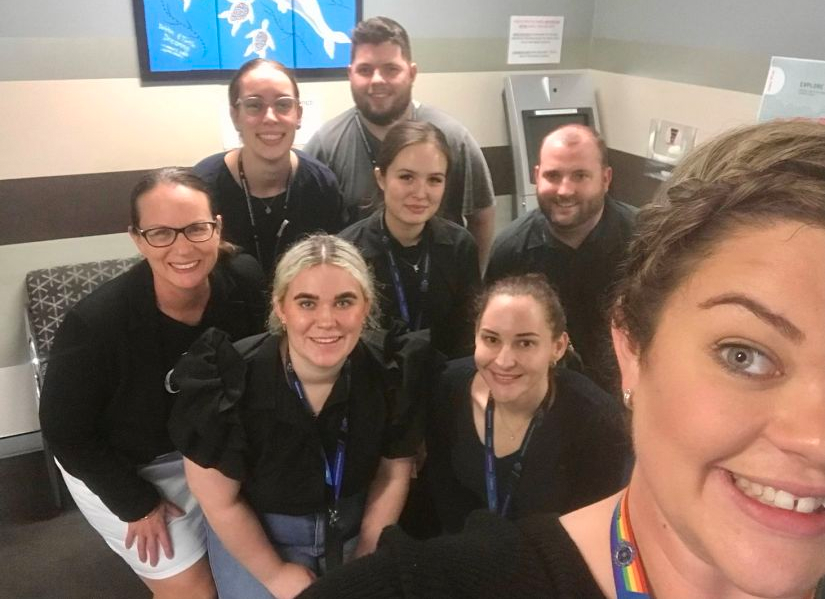
After working in marketing for most of her life Julie Andrews decided to take the plunge and pursue a career in Justice advocating for First Nations people, a dream she has had since childhood.
Now in her final year the mother of four has juggled running her own business, a family and maintaining an impressive GPA. Most recently she undertook a professional placement at the Department of Corrections where she researched and prepared a First Nations strategy that supports Indigenous clients who are serving probation, parole and other types of supervision.
Here she talks about being a mature-aged student and her placement in corrections.
Can you tell me about your professional placements while studying? Where was it and what did you enjoy about it?
I have been working at the Department of Corrections - Mt Gravatt Community Corrections branch this semester. My main task is to research and prepare a First Nations Strategy for the team to inform and guide their support of Indigenous clients who are serving probation, parole, or other types of supervision. I was given the opportunity to attend Magistrates Court sessions; QDAC sessions; and observe a wide variety of assessment interviews with offenders under supervision. However, the highlight was spending a morning with Auntie Nancy, the Cultural Liaison Officer at QDAC. She provided insight into gaps in service provision, systemic bias and discrimination that hinder the therapeutic approach to offender rehabilitation and ideas for improving cultural competence within government departments, including Police, Corrections, and Health. I have yet to visit the Murridhagun Cultural Centre, which has been arranged outside my placement timeframe. I am looking forward to observing how the professional training staff structure and deliver their programs to ensure Corrections staff support Indigenous peoples in custody as well as the staff who work within the organisation.
Why do you think placements are so important when studying Justice?
Placements are an incredible opportunity to use the skills that we have learned, such as research, report writing and critical analysis in a ‘real world’ context. I was particularly keen to apply for placement because I am a mature age student who is also changing careers. The opportunity to work at the Department of Corrections was empowering and rewarding. I was able to use the skills developed during my degree, from units such as Professional Academic Skills, Justice Research Methods and Theories of Crime. However, the real skill application came from units such as Understanding Trauma in Criminology, Case Studies in Major Crime, and my law major units. I felt confident that I belonged and was able to successfully undertake the task required of me. My previous work and life experience provided excellent support to be able to enjoy my placement without worrying about whether I was meeting expectations.
What did you get out of it?
My placement was the ‘icing on the cake’ of my degree. I have worked hard to maintain a high GPA whilst working full time and raising a family of four. It has also confirmed that I have made the right decision to change careers and that I am heading in the right direction. The Professional Placement Unit Co-ordinator, Kelly Richards, was so supportive. I felt that I could approach her at any time during the semester. Her facilitation of the weekly discussion forum was excellent. We were provided with so many resources and concepts to consider which encouraged excellent engagement and responses.
Has your placement helped you decide the career path you want to take?
The career that I have chosen has been one that I have wanted to be involved with since I was young. I am approaching 53 years old and am thrilled to be coming towards the end of my study and feel prepared to enter a career in Indigenous justice and youth advocacy. I am passionate about ensuring our First Nations peoples receive a voice, feel confident and supported to identify as Indigenous Australians and experience opportunities for self-determination. This will have a positive impact on their rights, as well as highlight and address systemic discrimination.
Did doing a placement open up any further opportunities?
I have been asked by my supervisor and District Manager if I would be interested in working within Corrections and have responded positively. We will continue to have conversations about how this can happen over the coming few weeks.
What are your future goals?
As I approach graduation in December 2022, I would like to secure an opportunity to work within an organisation that supports my career goals and will continue to network to open up such opportunities. I also plan to do a Masters or PhD in matters concerning Indigenous Justice such as overcoming systemic bias and the importance of acceptance, inclusion, supporting truth-telling, providing a voice within the political landscape and improving their trajectory towards self-determination.
Advice for mature age students
There is something that I have learned from doing my degree and, in particular, my placement that I found extremely helpful whilst navigating the system as a mature age student. Imposter syndrome is extremely real and should not be feared, it should be embraced. We all deserve an opportunity to improve our career prospects or change them as I have done. We also deserve an opportunity to apply for and compete for placements. They are empowering and have helped me overcome any doubts about my choices and confirm people in the workplace are accepting regardless of age. Be courageous. Attend all the QUT events that are run by the Justice Society. They are awesome opportunities to mix outside the lecture theatre and network with others including guest speakers and academics. Ask ALL the questions and be confident that you come with so many life skills that will give you an edge in the job-hunting arena!
Study a Bachelor of Justice
